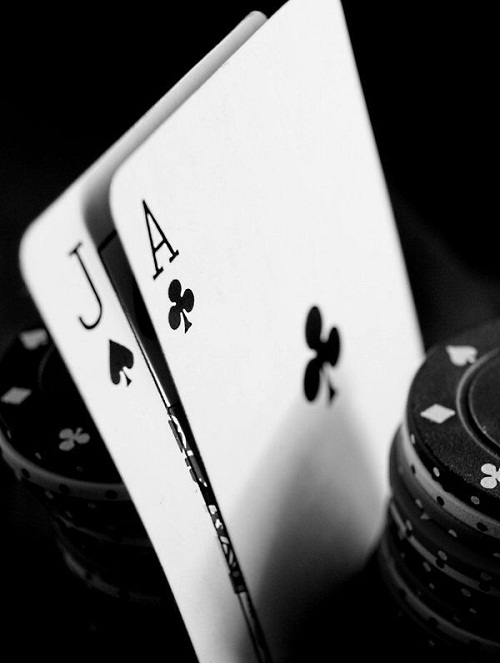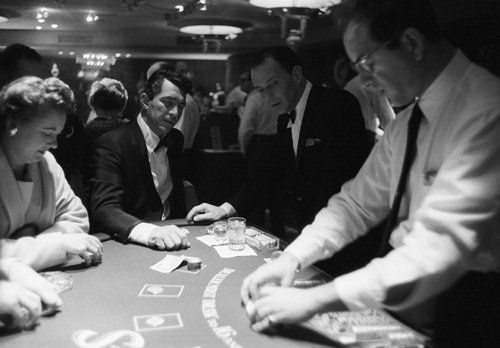The Rules of Blackjack
If you're not familiar with the Basic Rules of Blackjack we suggest you read this article so you don't miss out on this exciting game. If you're already familiar with the basics, you may want to check out our articles on the Basic Blackjack Strategies, the Variants of Blackjack or the Bankroll Management in Blackjack.
This article will only deal with the rules of Classic Blackjack or just simply Blackjack. If you are interested in variants, please take a look at our related article on the subject.
The Breakdown of a Hand
Before you start a hand in Blackjack you have to place an initial amount of chips (bet) on the table - that is going to be the base of the amount you can win or lose in the hand. After you placed your bet the dealer starts dealing the cards to you and themselves. (For the rest of the article I will assume that you're alone with the dealer since this is generally the case in online casinos.)
The dealer deals two face-up cards to you and a face-up and a face-down card to themselves. All the cards in the game have a predetermined value assigned to them: face-cards (K, Q, J) worth 10, 'number-cards' are worth the number on them. The Ace is a very special card in Blackjack as its value can be either 1 or 11 depending on what's best for the owner of the hand. For example, a hand of K7A counts as 18, not 28, but a hand of JA (the famous Blackjack) is 21 points. If an Ace in the hand can be 1 or 11 depending on the situation, the hand is called a soft hand (like A3 is a soft 14).
 |
If the dealer is showing an ace as their face-up card, there is a special bet you can take called the Insurance bet. You can choose to bet half of your original bet on the dealer having a Blackjack. If they do, you double this bet (but still lose the hand), if they don't you lose the Insurance bet. (Casino-strategy tip: never ever take Insurance bets.)
So the hands are dealt, you can see your hand and one of the dealer's cards. Assuming you or the dealer did not get a Blackjack, you have 4 options at this point:
a) Hit: this means you ask the dealer for another card and that card's value will be added to the total of your hand. If you decided to hit and your hand value exceeds 21 you 'bust' and are out of the game. If you did not bust though you have 2 options: hit again or stand.
b) Stand: if you wish to stop and not draw more cards, you can simply stand. This will end your turn and the dealer starts to play their own cards.
c) Double: if you feel like drawing exactly one card, but you are sure that's going to be a winner, you can double. This is basically a one-time hit after which you have to stand. As the name suggests you have to double your original bet in this case. Higher risk, higher reward.
d) Split: if both your cards are of the same rank, you can split them into two separate hands and play them simultaneously. This means you have to put in another bet of the same value for your second hand.
Once you bust, stand or double, your turn ends, and in the case of you not exceeding 21 the dealer will start to deal their own hand. In Classic Blackjack the dealer has strict rules to follow, they have no 'free will'. Here are the rules that a dealer must follow: - The dealer has to hit if the hand's value is below 17. - The dealer has to stand if the hand's value is equal to or greater than 17. - The only debated case is if the dealer should stand on soft 17 (like 6A or 24A), that is not set in stone and changes from casino to casino. Generally dealers must stand on soft 17, but be sure to check the rules about this at your casino's blackjack table.
Once the dealer hits 17 or busts the hand is over. If noone busted, the higher hand value wins, in case of a tie, a push is called and you get your original bet back.
 |
The House Advantage
In all Casino games the house has the advantage by design of the game. But 'where is the advantage' - you could ask, since most of the rules seem to favour the player. The advantage is well hidden, and comes solely from the fact that if both you and the dealer bust, you lose. This counteracts all those advantages you seemingly have with the dealer rules, the doubling option, etc. This advantage is ~0.5-1.5% depending on the subtle details in the rules that you don't have to worry about for now.
Now that the rules are clear we can start playing. To play you will need a strategy - so we suggest you check out our Basic Strategy Chart for Blackjack article. Another important thing is to not take unnecessary risks - check out Bankroll Management about that. Finally, if you'd like to know more about the different Variants of the game, we have just the article for you, and you can find it right here.

Using Gambling Strategies To Maximise Your Online Casino Bonus
Casino bonuses first appeared in Las Vegas, the fierce competition between rival casinos meant bonuses were used as a marketing technique to lure potential cust...
read more!About Casino Strategy
If you want to improve your roulette strategy, blackjack strategy, or slot strategy, and you want to get preferred access to the very best online casino bonuses and promotions… Then our online casino strategies and tactics right here on casino-strategy.com are perfect. And it's all free just for you!
Read about our casino promotions & news, including top games online casinos have, and get the best casino bonuses on the planet from Casino Strategy.
Learn, play, win and enjoy!












